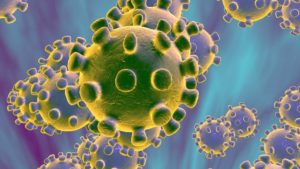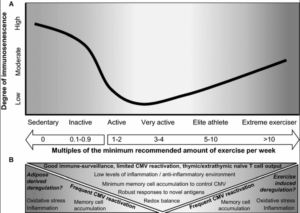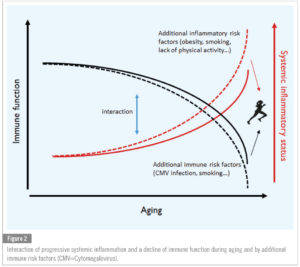How does exercise interact with our immune system? Will I catch coronavirus if I do exercise?
Coronavirus is a buzzword that gets thrown around a lot. There are a lot of justified fears circulating around this virus due to its virility and extent of symptoms. But what are the instances between coronavirus and exercises? Am I more susceptible to flu symptoms if I exercise? What are the dynamics between immunity and exercise?

The two adages that we’re familiar with hearing:
- Exercises increases immunity therefore we should exercise to promote a healthier and stronger immune system
- Exercise depreciates immunity therefore we should refrain from exercise.
Which one is correct? Which one should we follow? The answer is more complex than we think. In this post we will dissect the context of each claim and see how we can pragmatically implement this advice into our lives.
There is a prevailing myth purports that one single vigorous bout of exercise can decrease immune function. We have head many stories of amateur athletes cycling 80km or participating in a triathlon and contracting a cold or in more serious conditions pneumonia. Within the realm of anecdotal evidence this is true. There is also an outdated study of the 90’s that claimed that:
- Infection risk is increased after an acute bout of prolonged and vigorous aerobic exercise
- Unfamiliar periods of vigorous exercise can lead to a reduction in immunoglobulins that lead to increased risk of infection.
- Sudden loss of blood count (as blood is pumped into our muscles, and oxygen expenditure used most in muscles) may decrease the number of peripheral blood immune cells leading to immune suppression.
This is the ‘open window’ theory that claims that immunity is compromised by vigorous exercises.
This is false.
The evidence for acute infection caused by vigorous exercise remains very thin. Flu like symptoms observed after a bout of vigorous exercise is most likely caused by underlying physical, nutritional and psychological deficits prior to undertaking vigorous exercises. When participating exercise within gym and group settings, it is likely that increased exposure to pathogens, or the influence of environmental factors that can affect immune function (e.g., travel, sleep disruption) leading to real infection.

So, what does exercise actually do to our immune system?
In fact, vigorous exercise and regular exercise can increase our immune system. It acts as an adjuvant that actually prolongs immune responses. Contemporary evidence from epidemiological studies shows that physical activity reduces the incidence of communicable (e.g., bacterial and viral infections) and non-communicable diseases (e.g., cancer), implying that immune competency is enhanced by regular exercise bouts. There is an ongoing consensus in the health sphere that at the least, physical exercise has no effect on immunological health, but it is never a detriment in any way to immune competency. Exercise can also decrease rate of immunological aging – where as we age, the immediacy and reactivity of our immune system slows.
What should I do in light of the coronavirus?
As exercise increases potential vaccination responses, increases immune surveillance and counter the age-associated decline in immune function (immunosenescence), the overarching recommendation is to participate in any form of training, increase sleep for boosted immune/immunoglobulin levels and take the appropriate supplementations recommended for you. “Moderate intensity exercise improves immune function and potentially reduces risk and severity of respiratory viral infection.” Everything is about decreasing underlying physical, nutritional and psychological deficits therefore get enough sleep, eat properly and stay active.

How to boost immunity:
Get enough sleep (approximately 8 hours)
Do 20 – 30 mins of exercise a day – Be friends with exercise!
Get the right nutritional intake and take your supplements if required (zinc, vitamin C, selenium, etc)

Written by Joshua Shum Physiotherapist
